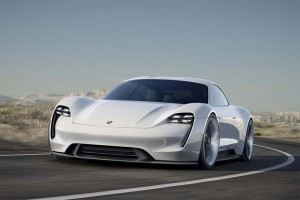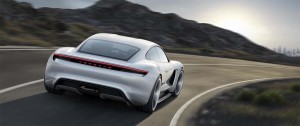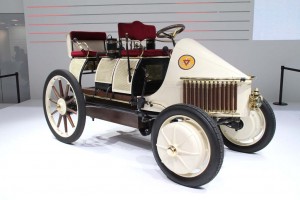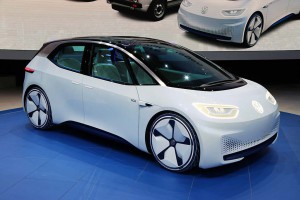
Workers at Porsche's Zuffhausen plant in Germany agreed to wage cuts in order to get the job of building the new Mission E.
Porsche is aiming for annual sales of about 20,000 Mission E battery-electric vehicles, according to the sports car brand’s chief executive officer.
That would make it one of the more important products in the company’s line-up and more than double the numbers needed to turn a profit, according to another company official.
The launch of the Mission E in 2019 is part of an aggressive transformation planned by the Volkswagen Group, currently the world’s largest automaker by sales volume. But news reports from Germany suggest that there is an internal battle brewing between various VWAG brands as they position themselves to take the lead in battery-electric vehicle development.
Porsche has a history of experimenting with electric propulsion. In fact, the very first production model created by Ferdinand Porsche, the carmaker’s founder and namesake, was a plug-in hybrid, the Loehner-Porsche, developed in 1899 for a small Austrian company. Porsche’s own 918 Spyder, its most recent flagship, used a more modern plug-in hybrid system.
(Porsche plugs in with stretched, PHEV Panamera Executive. Click Here for a closer look.)
The Porsche Mission E will become the German company’s first all-electric high-performance model. First unveiled at the Frankfurt Motor Show in September 2015, it will pair two motors, one on each axle, producing a combined 600-horsepower. The layout creates a concept often referred to as “through-the-road-all-wheel-drive,” which helps enhance traction.
Final productions have yet to be released, but in concept form, the Porsche Mission E borrows a page from the 911 Turbo tech spec page, adding all-wheel-steering, as well, to further enhance handling at high speeds, and maneuverability when crawling around on city streets or in a parking lot.
The Porsche Mission E is almost exactly the length of a 911, but about an inch wider. It features a more sci-fi like shape, a blend of the 911 and 918 Spider, aerodynamics critical to enhancing both performance and range. Porsche has targeted a 0 to 60 launch time of around 3.5 seconds, while under less aggressive driving, the Mission E is expected to deliver around 300 miles per charge.
The German maker is confident that there will be strong demand for the new battery sports car, Porsche CEO Oliver Blume telling Germany’s Automobilwoche magazine, “We have calculated a quantity in the order of about 20,000 for the Mission E.”
That would represent about 60% of last year’s volume for the iconic 911, and barely a quarter of the 80,000 Macan SUVs sold worldwide in 2015. But, analysts say that would nonetheless represent a major launch for an all-new electric model by a brand best known for its high-performance internal combustion engines.
Meanwhile, Porsche’s labor chief Uwe Hueck said during a July interview that the carmaker would need to sell just 10,000 of the new EVs to turn a profit. The company has not yet revealed the total investment in the program but is creating a special assembly line to handle the Mission E and will add about 1,400 new jobs for the project.
(At 1,200 hp, this new car could be one of the world’s fastest – and it’s electric. Click Here for more.)
The Mission E is just one of a vast array of new battery-based products – including conventional hybrids, plug-ins and pure battery-electric vehicles – under development by Volkswagen AG. The automaker has given strong indication it will move away from the controversial diesels that long anchored its line-up in favor of electrified powertrains.
“Why don’t you put the money on the spot where the future is?” Hinrich Woebcken, CEO of the Volkswagen Group of America, suggested during a conversation with reporters at the Los Angeles Auto Show earlier this month.
But the aggressive push is creating some intense internal rivalries within the 13-brand empire headquartered in Wolfsburg, Germany, according to a report by Reuters. “Just as Porsche and Audi have fought for supremacy on the race track, the Volkswagen brands are now locked in a cut-throat battle to develop and manufacture the next generation of electric cars,” the news service reported.
The battle is particularly intense between the mainstream VW brand and its upscale siblings, such as Porsche and Audi, to dominate development. The challenge is significant as each brand has a different idea on how it should use electric powertrain technology. But a focus on high performance could pose challenges for the VW brand if it were to drive up costs. Emphasizing cost over performance, on the other hand, could limit the appeal for a high-line brand.
VW has dismissed what it referred to as “speculation,” spokesman Eric Felber insisting the reports are “something which we emphatically reject.”
What’s clear is that VW is planning to invest billions of dollars and shift R&D and manufacturing resources to focus on electrification. Earlier this month, the maker announced plans to cut 30,000 traditional jobs. But it will add about 9,000 new slots to focus on new opportunities, including battery drive systems.
(VW teases new “premium fastback” to debut in 2018. Click Here to check it out.)



